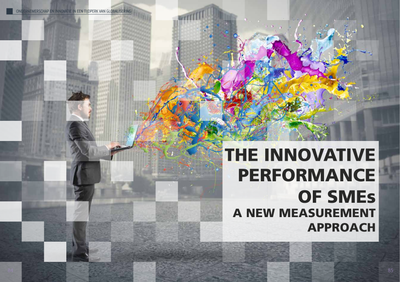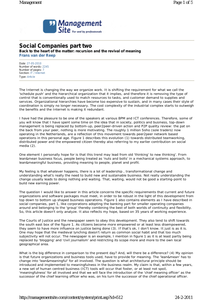In deze bijdrage Migratie en politiek aan het congres over “Globalisierung und Flucht” in Eupen op 25 september 2004, worden eerst de begrippen met betrekking tot globalisering gedefinieerd , beschreven en geanalyseerd, vervolgens wordt globalisering gerelateerd aan migratie en de verschillende benamingen van migranten en integratie die daar in de loop van de tijd op zijn geplakt. Daarna komt uitvoerig het Nederlandse beleid aan de orde, dat trendsettend lijkt te zijn voor Europa. Tot slot enige opmerkingen over Europa en een opinie van David Pinto, hoogleraar/directeur van het intercultureel instituut (ICI) te Amsterdam, die wellicht aanleiding tot discussie kan zijn.
DOCUMENT

Dit artikel is gewijd aan de kernbegrippen van dit themanummer: innoveren, ondernemen, globalisering en de relaties daartussen. Uiteenlopende invalshoeken en disciplines zijn nodig om die verbanden te duiden. Gebruikmakend van kennis over innovaties en innovatieprocessen laten zich verschillende typen innovaties schetsen. Door innoveren in historisch perspectief te plaatsen laat zich de relatie leggen naar globalisering. Economie en economische wetenschap maken het mogelijk om de relatie tussen innoveren en ondernemen te expliciteren. Sociale psychologie tenslotte helpt bij het beantwoorden van een hele praktische vraag: innoveren – hoe doe je dat?1
DOCUMENT

Verhandeling over globaliseringsprocessen en cultuur- en gemeenschapscentra.
DOCUMENT
Het belang van innovatie voor economische groei en het scheppen van werkgelegenheid in het MKB wordt erkend door zowel academici als politici. Er worden daarom programma’s ontwikkeld om innovatie te stimuleren. Met deze maatregelen ontstaat de vraag te bepalen of deze initiatieven succesvol zijn en zo ja, in welke mate. In de literatuur hebben we geen indicator gevonden die ons in staat stelt de mate van innovativiteit van MKB bedrijven te bepalen voor een dergelijke interventie en daarna. De hoofdvraag van ons onderzoek was dan ook: hoe kunnen we het effect van een interventie voor het bevorderen van de innovatiekracht van MKB-bedrijven meten? Kijkend naar de definities van innovatie zoals die zijn verzameld door King & Anderson (2002) hebben we vastgesteld dat een bedrijf innovatief genoemd mag worden als het met opzeten succesvol nieuwe ideeën implementeert. Succesvol wil in dit verband zeggen: het draagt bij aan de winst en dus aan de continuïteit van het desbetreffende MKB-bedrijf. Door de verschillende (bewuste) innovaties te identificeren samen met de ondernemer en te berekenen wat de winstgevendheid is geweest van de innovaties, kunnen we de ’innovatiewinst’ van de ondernemer berekenen. Dit bedrag delen door de omzet creëert een indicator waarmee de innovativiteit van de organisatie door de tijd gemeten kan worden. Wij stellen daarom de volgende definitie van innovatiekracht voor: KIKR = [ [Winst Innovatie1+Winst Innovatie2+ ... +Winst Innovatie5] / Omzet] x 100. De ratio kan alleen met voldoende betrouwbaarheid bepaald worden door een gestructureerd interview met de directeur/ eigenaar van de het bedrijf door een gekwalificeerde gesprekspartner. De auteurs realiseren zich dat dit gesprek op zichzelf misschien een interventie is, omdat de ervaring leert dat het innovatiebewustzijn van de ondernemer er door toeneemt. Om te bepalen of dit daadwerkelijk zo is, en om te testen of de KIKR inderdaad als bruikbare maat voor innovatiekracht kan worden gebruikt is vervolgonderzoek noodzakelijk. Desalniettemin zijn de auteurs van mening dat met de KIKR de innovatiekracht van bedrijven door de tijd heen gemeten kan worden en daarmee een bruikbaar instrument is om het effect te bepalen van interventies die innovatiekracht moeten vergroten. The importance of innovation as an engine for economic growth and the creation of employment opportunities is acknowledged by both academia and politicians. This makes the need for good innovation measures crucial. In the third edition of the Oslo Manual (2005), a need for proper indicators to capture the changes in the nature and landscape of innovation is voiced. According to the manual, a considerable body of models and analytical frameworks for innovation were developed in the 1980s and 1990s. Over time, the scope of what is considered as innovation has been widened and expanded to include marketing and organizational innovation. In this paper, we focus on innovative performance as a measure of success. This is part of ongoing research in the Netherlands in The Hague region. This research is framed within an approach based on action research. We have worked with 45 SMEs in four sectors. This has formed the basis for the conceptual development of innovative performance as a new metric for the measurement of a successful innovation. In this paper, we review our findings thus far and explore the validity of innovative performance as an appropriate indicator for measuring innovation within SMEs.
DOCUMENT

This research explores two processes: globalisation and regionalisation. They will be analysed by means of what the author calls the 'conceptual triangle': the mutual interdependence of politics, economy and society. This analysis will be undertaken from a cultural sociological perspective. This means, that especially the way people value and give meaning to the processes of globalisation and regionalisation - but also vice versa: how these processes influence the values and meaningful structures of people - are central to this study.
DOCUMENT

In dit artikel wordt een update gegeven van de ontwikkelingen rondom de samenwerking tussen Marynmount University en de Hanzehogeschool. Beide universities zijn als team een onderdeel van het COIL-project: een initiatief van de State University of New York waarin Amerikaanse universiteiten samenwerken met Internationale partners bij het ontwikkelen van Globally Networked Courses. Het Hanze-Marymount team zal een course ontwikkelen omtrent het thema Globalisering en zal binnen de Interdisciplinaire lijn van het Honours College geplaatst worden
DOCUMENT
Dit boek is een pleidooi voor de erkenning van de complexiteit van de wereld waarin managers, professionals en beleidsmakers moeten opereren. De instrumenten die tot nu toe voorhanden zijn, bieden vaak te weinig soelaas en vergroten juist regelmatig de problemen. Het is tijd om nieuwe begrippen te omarmen, afkomstig uit systeem-en complexiteits-theorieën. Zo kunnen we uitdagingen als robotisering, polarisatie, burn-out, globalisering en cybercriminaliteit en vele andere thema’s wél de baas. Deze belofte wordt in dit boek waargemaakt waarbij de ontwikkeling van systeemwijsheid de eerste stap is.
DOCUMENT
All over the world entrepreneurs drive changes. They develop new products and services, inspire others and take decisions that result in growth of their businesses. But the world around entrepreneurs is changing and so are entrepreneurs. Life-long selfemployment or permanent wage employment are of the past. And the way people perceive self-employment is changing as well. And so must our thinking. Changes in our society call for policies and programmes in support of enterprising people. Diversity, mobility and connectivity offer new opportunities for enterprising people. Markets are changing, become more accessible and there is less need to be bound physically to one place for an entrepreneur. New avenues for business are open thanks to our improved access to information, our connectivity globally through social media and our ability to travel freely and frequently from one country to another. With less focus on life-long (self) employment people now combine paid work (or unpaid – house- work) with self-employment, or opt for just parttime entrepreneurship. New, hybrid forms of enterprising emerge. This combining of work with self-employment is rather common in developing countries, but in Europe it is a phenomenon not yet reported on in statistics and for which policy makers and service providers have no answers yet. Neither exist clear definitions or classifications. This book may serve as an eye-opener: hybrid entrepreneurs are indeed around us and deserve our attention. The research unit Financial Inclusion and New Entrepreneurship of The Hague University of Applied Science challenges policy makers, academics and service providers (such as educational institutes, business advisers and financial institutions) to pay more attention to hybrid entrepreneurs, those enterprising people who intend to create new values for a fair and sustainable society. They might not yet been seen, but they exist…..
DOCUMENT

This Article presents the PSO matrix as a tool for making choices in change projects – choices for simplicity or for complexity. A good process structure is essential for a simple organization, but it is the employees and the managers who are expected to take the lead in the changes and the improvement proposals. The PSO matrix is a useful and usable instrument that promotes simplicity and respects the intelligence that is already present in the organization, particularly that of the ordinary employees. The approach leads to drastic savings. Do as much nothing as possible.
MULTIFILE

The Internet is changing the way we organize work. It is shifting the requirement for what we call the ‘schedule push’ and the hierarchical organization that it implies, and therefore it is removing the type of control that is conventionally used to match resources to tasks, and customer demand to supplies and services. Organizational hierarchies have become too expensive to sustain, and in many cases their style of coordination is simply no longer necessary. The cost complexity of the industrial complex starts to outweigh the benefits and the Internet is making it redundant.
MULTIFILE
